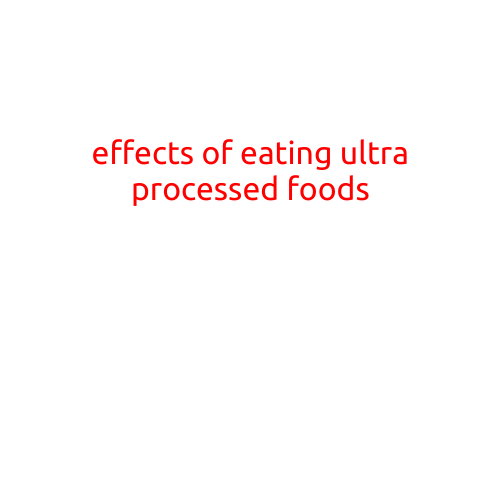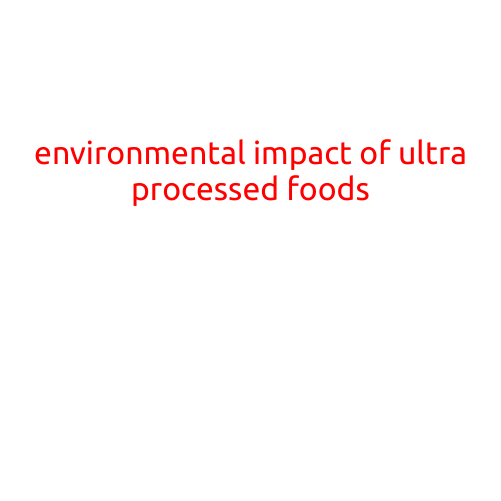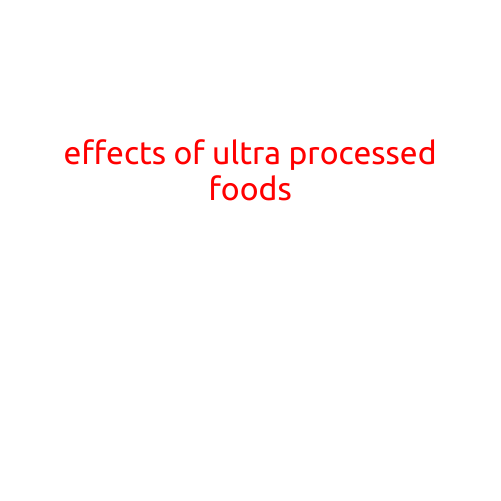
The Devastating Effects of Eating Ultra-Processed Foods
In recent years, the world has been witnessing a significant shift in the way people consume food. With the rise of convenience and busy lifestyles, ultra-processed foods have become an increasingly common staple in many people’s diets. These foods are created in laboratories, not in kitchens, and are designed to be cheap, convenient, and long-lasting.
While they may tantalize our taste buds and satisfy our cravings, ultra-processed foods are having a devastating impact on our health and wellbeing. In this article, we’ll delve into the effects of eating ultra-processed foods and explore the reasons why it’s essential to limit or eliminate them from our diets.
What are Ultra-Processed Foods?
Ultra-processed foods are products that have undergone significant industrial processing, such as adding preservatives, flavorings, and coloring. They often contain a combination of sugar, salt, and unhealthy fats, and may contain a number of artificial additives.
Examples of ultra-processed foods include:
- Packaged snack foods, such as chips and crackers
- Frozen meals, such as pizzas and TV dinners
- Sugary drinks, like soda and sports drinks
- Baked goods, such as cookies and cakes
- Condiments, such as ketchup and mayonnaise
Negative Effects on Health
Consuming ultra-processed foods regularly has been linked to a range of negative health effects, including:
- Weight gain and obesity: Ultra-processed foods are high in calories, sugar, and unhealthy fats, making it easy to consume excess energy and leading to weight gain and obesity.
- Increased risk of chronic diseases: Eating ultra-processed foods has been linked to a higher risk of developing chronic diseases, such as heart disease, stroke, and type 2 diabetes.
- Dental problems: The high sugar content in ultra-processed foods contributes to tooth decay, cavities, and gum disease.
- Digestive issues: The high levels of preservatives and additives in ultra-processed foods can lead to digestive problems, such as bloating, gas, and stomach pain.
- Mood disturbances: The artificial additives and sugar in ultra-processed foods can disrupt brain function and lead to mood disturbances, such as anxiety and depression.
Why Ultra-Processed Foods are Addictive
Ultra-processed foods are designed to be highly palatable and addictive. They use a combination of sugar, salt, and fat to activate the brain’s reward centers, releasing feel-good chemicals like dopamine. This can lead to overconsumption and compulsive eating.
Additionally, ultra-processed foods are often designed to be consumed rapidly and mindlessly, without much attention or satisfaction. This can lead to a feeling of emptiness and craving, which can be fulfilled only by consuming more ultra-processed foods.
How to Avoid Ultra-Processed Foods
The good news is that it’s possible to limit or eliminate ultra-processed foods from your diet. Here are some tips:
- Cook from scratch: Cooking meals from scratch using whole, nutrient-dense ingredients is the best way to avoid ultra-processed foods.
- Read labels: When shopping, read food labels carefully and avoid products that list numbers or chemical names.
- Emphasize whole grains: Choose whole grains, such as brown rice, quinoa, and whole wheat bread, instead of refined or processed grains.
- Limit sugary drinks: Cut down on sugary drinks, such as soda, sports drinks, and sweetened teas and coffee.
- Shop the perimeter: When shopping, try to stick to the perimeter of the store, where fresh produce, meats, and dairy products are typically located.
Conclusion
Consuming ultra-processed foods regularly can have devastating effects on our health and wellbeing. By understanding the negative impacts of these foods and taking steps to limit or eliminate them from our diets, we can make positive changes to our health and wellbeing. By choosing whole, nutrient-dense foods and cooking meals from scratch, we can fuel our bodies with the nutrients they need to thrive.





